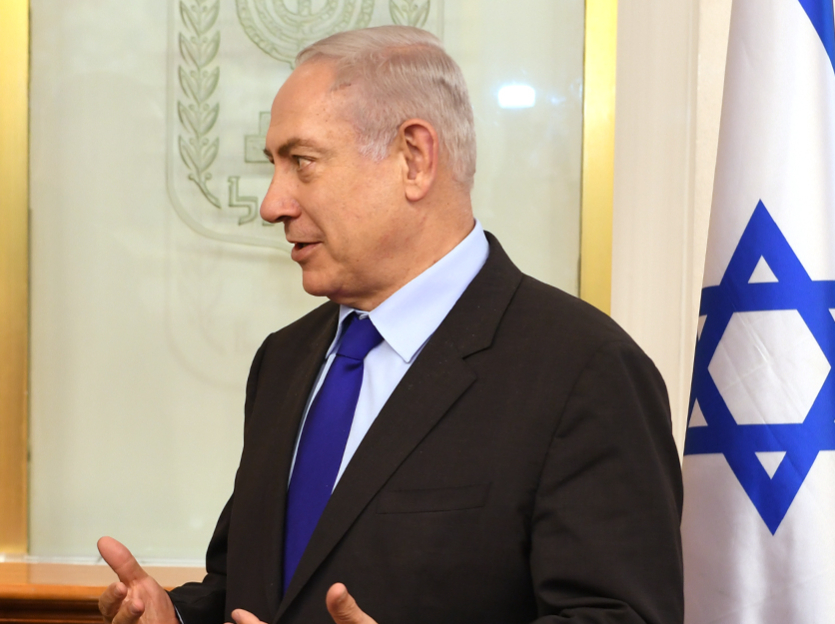Civilization
Israel and the United States Must Upgrade Their Diplomacy

On May 9, President Joe Biden threatened to withhold from Israel key weapons if the Jewish state proceeded with a major invasion of Gaza’s southernmost city, Rafah, where Hamas retains several intact battalions. On May 10, Israeli Prime Minister Benjamin Netanyahu fired back: “If we have to stand alone, we will stand alone. If we need to, we will fight with our fingernails. But we have much more than fingernails.” Military spokesman Rear Adm. Daniel Hagari affirmed that Israel “has munitions for the missions it plans, and for the missions in Rafah, too.”
Israel has always taken full responsibility for its own security
The prime minister’s defiant rejoinder to President Biden and the admiral’s firm reassurance reiterated the nation’s traditional national security doctrine: Israel must take full responsibility for its security. It must make the final decisions about its vital national interests and the best means for advancing them. And it must fight its own battles.
Bold words and traditional doctrines, though, should not obscure basic facts. However ill-advised Biden’s threat, Israel’s ability to defend itself in the multi-front war launched by the Islamic Republic of Iran and its regional proxies depends on the United States’ readiness to keep Israel well-supplied with munitions and other essential military equipment.
Although Israel has to an extraordinary extent since its founding fought its own battles, it never freed itself from strategic dependence on other nations. From its birth in May 1948 to the current multi-front war, the Jewish state has relied on others for crucial weapons. Still lacking 76 years after its birth a homegrown and diversified military-industrial complex, Israel imports much of its equipment – munitions, bombs and rockets, small arms, and nearly all its military aircraft – from the United States.
Consequently, the Netanyahu government needs a national security strategy that not only respects harsh Middle East realities, but which also reckons with essential geopolitical imperatives and diplomatic exigencies. Foremost among these is maintaining good relations with the United States.
Biden’s flip-flop
Despite its initial strong support for Israel after Hamas’ Oct. 7 attacks and its largely uninterrupted provisions of weapons to the Jewish state, the Biden administration has strained diplomatic relations. By regularly reproaching Israel publicly, the White House has fostered the impression that the humanitarian crisis in Gaza is Israel’s fault. Yet contrary to the international laws of war Hamas transformed Gaza’s cities into warzones, uses civilians and civilian infrastructure as shields, and seizes humanitarian goods intended for noncombatants.
By declining for the last seven months to demand daily the release of the approximately 130 hostages – living and dead, including five Americans – illegally held by Hamas in nightmare conditions, the White House bolsters the impression that Hamas possesses neither agency nor accountability. And by withholding, according to the Washington Post, “sensitive intelligence” concerning the whereabouts of Hamas mastermind Yahya Sinwar and the layout of Hamas’ labyrinth of tunnels unless Israel agrees to abandon plans for a full-scale invasion of Rafah, the White House has prolonged the war and protected not only Israel’s enemy but a sworn adversary of the United States and the West.
But Israel cannot afford to sulk
The Biden administration’s equivocations, omissions, and strong-arm tactics, to put matters gently, have dismayed the Netanyahu government as well as many members of the opposition. But lashing out or sulking is not the answer. Jerusalem must summon diplomatic finesse to maintain its military might. For the near and intermediate term, Israel’s capacity to defend itself from the forces of jihadism that surround it remains bound up with American productive capabilities, the strategic judgment of American defense specialists and foreign-policy hands, and the generosity of the American people.
Commanders for Israel’s Security (CIS) has produced a concise document that combines an appreciation of diplomatic necessity and military necessity. An organization of more than 300 former senior military officers and officials including all branches of the IDF as well as equivalents from the police, the Shabak (internal security service), and the Mossad (intelligence), CIS takes the long view in “The Way Forward.” The recently released paper presents analysis and proposals “aimed at ensuring the State of Israel’s security for generations to come, with Israeli society emerging from the crisis stronger, better protected, healthier, more united and democratic, and with the rehabilitation and enhancement of Israel’s international standing.”
Setting two important strategic goals
The CIS roadmap for “the day after” Israel completes major military operations in Gaza refines and expands the familiar statement of Israel’s war aims. Going beyond the Netanyahu government’s emphasis on destroying Hamas’ ability to govern in Gaza and wage war and freeing the hostages, CIS identifies two additional “overarching strategic objectives.” First, the former commanders stress that Israel must enable citizens to return to their homes not only in the south on the nation’s border with Gaza but also in the north on Israel’s border with Lebanon where, since Oct. 7, Iran-backed Hezbollah has been attacking with drones and rockets.
Second, CIS wants to build on Israel’s joint operation on April 14 with the United States, Britain, France, Jordan, Saudi Arabia, and other Arab countries that knocked out of the skies 99% of the drones, cruise missiles, and ballistic missiles that Iran launched against targets in Israel. Turning that cooperation into a strategic asset, Israel ought, advises CIS, “to initiate, promote, and become an integral part of a regional strategic security axis, under American leadership, as a response to the threat of the Iranian-led so called ‘resistance axis.’”
Strengthen partnerships – and settle the intramural conflict among Palestinians
To accomplish these overarching strategic objectives, CIS argues, Israel must grasp key geopolitical realities. Hamas in Gaza – like Hamas in Judea and Samaria (the West Bank) – can be degraded but not eliminated. Israel must enhance its partnerships. Western – especially U.S. – support is essential. And the Palestinian Authority – weak, corrupt, and implicated in terror – remains the Palestinian people’s official representative and continues to provide vital cooperation in the fight against Hamas in Judea and Samaria.
Israel must also recognize, CIS maintains, the collapse of several basic ideas that organized Israeli strategic thinking during the decade and more before Oct. 7. In the retired commanders’ view, peace with the larger Arab world cannot be isolated “from a permanent solution to the Palestinian question.” Dividing the Palestinians by supporting the PA in the West Bank and Hamas in Gaza undermined Israel’s security. Palestinian national aspirations to self-rule must be accommodated. And rather than managing the conflict with the Palestinians, Israel should concentrate on “resolving” it, because the conflict’s perpetuation will inflict increasingly severe harm on Israel.
Aiming too high and too soon?
CIS clarifies political exigencies and draws pertinent lessons from the errors of the past, but the retired commanders perpetuate one old mistake. They raise the bar too high for diplomacy by insisting on “a permanent solution to the Palestinian question” and in supposing that “resolving” the Israeli-Palestinian conflict is within reach. It is one thing to identify a long-term goal and conditions for its achievement – say, the establishment of a Palestinian state provided that the PA affirms that Israel is the nation-state of the Jewish people and agrees to demilitarization. It is quite another to suppose that that long-term goal can be expeditiously achieved in the near term and, if eventually achieved, will dissolve deep-rooted nationalist enmities and religiously sanctioned hostilities.
Both the intention to manage the conflict and the aspiration to permanently resolve it should be set aside in favor of efforts to reduce the conflict’s severity. That would not undercut CIS’ emphasis on diplomacy. It would reinforce it.
As Defense Minister Yoav Galant recently stated, preparations for governing Gaza following Hamas’ defeat should have begun last October. The task is manifold: not only standing up “a local, non-hostile Palestinian governing alternative,” but also caring for the wounded and displaced, rebuilding physical infrastructure, providing internal security, and remaking the educational system – even as Israel retains overall security responsibility. This will cost tens of billions of dollars, take years, and demand a variety of contributions from a multiplicity of partners.
Israel and the USA must work together
Accordingly, CIS urges Israel to work with “the U.S. and other states to forge a peace coalition – to include Egypt, Jordan, Morocco, Bahrain, and the UAE, as well as Saudi Arabia and other states in the region, as well as the Palestinian Authority – and help formulate components of the initiative that would also take Israel’s security needs into consideration.” And CIS emphasizes that “this type of coalition would maximize the chances of achieving Israel’s strategic objective, mobilize effective opposition to Iran, and facilitate various security arrangements – for example, enforcing the implementation of UN Security Council Resolution 1701 (2006) in Lebanon, inter alia distancing the Hezbollah terror organization from Israel’s northern border.”
To form and maintain that coalition, Israel and the United States must upgrade their diplomacy. One important step – especially for the United States, which is particularly prone to projecting its beliefs, attitudes, and preferences on foreign peoples and lands – consists in understanding that the only viable path to reducing the severity of the Israeli-Palestinian conflict involves devising incremental measures that gradually increase Palestinian self-rule without diminishing Israeli security.
This article was originally published by RealClearPolitics and made available via RealClearWire.
Peter Berkowitz is the Tad and Dianne Taube senior fellow at the Hoover Institution, Stanford University. From 2019 to 2021, he served as director of the Policy Planning Staff at the U.S. State Department.
-

 Executive5 days ago
Executive5 days agoWaste of the Day: Secret Settlements get Taxpayer Money
-

 Accountability2 days ago
Accountability2 days agoWaste of the Day: Principal Bought Lobster with School Funds
-

 Constitution1 day ago
Constitution1 day agoTrump, Canada, and the Constitutional Problem Beneath the Bridge
-

 Executive8 hours ago
Executive8 hours agoHow Relaxed COVID-Era Rules Fueled Minnesota’s Biggest Scam
-

 Civilization7 hours ago
Civilization7 hours agoThe End of Purple States and Competitive Districts
-

 Civilization4 days ago
Civilization4 days agoThe devil is in the details
-

 Executive3 days ago
Executive3 days agoTwo New Books Bash Covid Failures
-

 Executive3 days ago
Executive3 days agoThe Israeli Lesson Democrats Ignore at Their Peril












